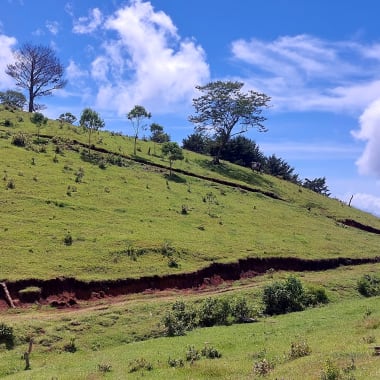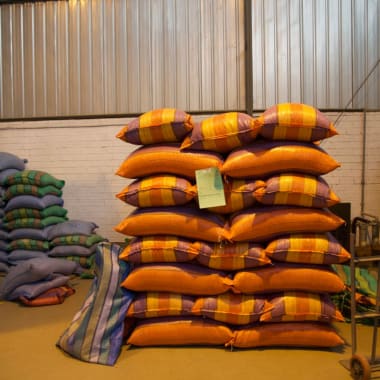-
Producer
-
Lucio Mamani
-
Country
- Bolivia
-
Region
-
Caranavi
-
Altitude
-
1,600–1,750m above sea level
-
Variety
-
Process
-
Harvested
-
February 2020
-
Importer
-
Melbourne Coffee Merchants
-
Body
-
Medium
-
Acidity
-
Medium
-
Tasting notes
-
Dried date, honey and jasmine
-
Roast style
Bolivia
Lucio Mamani
Lucio’s farm is 13 hectares in size and grows at 1,600–1,750 metres above sea level. Around four hectares are planted with Caturra, Catuaí and Typica variety coffee trees.
These grow alongside mandarins, oranges, potatoes, and apples that Lucio sells to supplement his income outside the coffee season.
At their prime, Lucio and his children (who own neighbouring farms) enjoyed many good years in coffee production and produced around 120 bags of coffee a year, which they exported to specialty buyers in the USA and Europe.
Unfortunately, in 2012, their farm (like most in Bolivia) was hit by leaf rust, and they didn’t know how to combat the disease. Devastated and desperate, the family considered leaving their farm behind, but coffee was all that they knew. Caturra – the varietal in the crop we’re sharing today — has particularly bad resistance to leaf rust.
They persisted for a couple of years, producing low yields and planting fruit trees to supplement their income.
Luckily in 2015, they were approached by the Rodriguez family of Agricafe, who invited them to participate in a producer training program called Sol de la Mañana.
Agricafe is a Bolivian family business owned by Pedro Rodriguez and his daughter Daniela and son Pedro Pablo. The trio’s mission is to build the production of, and market for, Bolivian specialty coffee. To do this, they have invested efforts and funding across the entire specialty coffee production chain, including buying coffee from hundreds of local farmers, establishing state-of-the-art wet and dry mills, launching producer training programs, and planting new coffee farms across the regions of Caranavi and Samaipata.
Over the last decade, Agricafe has been working to try and save the Bolivian coffee industry. Despite its international recognition and highly sought after coffees, the production of coffee across Bolivia has decreased dramatically and has been at risk of completely disappearing. A combination of ageing coffee plantations, traditional and very unsophisticated farming techniques and diseases such as leaf rust have resulted in significantly reduced yields, and this, combined with the proliferation of the competing coca industry (used for cocaine), has seen coffee production more than halve.
To try to save coffee production in Bolivia and build a more sustainable future for it, the Rodriguez family started a project called Sol de la Mañana (which translates to ‘morning sun’).
This particular lot from Lucio and his family was carefully hand-picked and processed on the same day at the Buena Vista washing station. This meticulously run mill is owned by Agricafe, who painstakingly process each of the exceptional specialty lots they receive separately to allow for full traceability back to the individual farmer or settlement.
Evenings at the mill are always bustling as arrivals of fresh cherries begin in the late afternoon after the day’s picking, and continue deep into the night. It is widely known around Caranavi that only perfectly ripe cherries will be accepted by this mill and all lots are inspected on arrival prior to processing. In an arrangement somewhat unique to this mill, many farmers use taxis to deliver coffee, and by 7 pm a long line of taxis forms along the road leading to the mill.
After being inspected and weighed, the coffee is carefully sorted by weight using water, and floaters removed.
Learn everything about this coffee:
Ethical, traceable sourcing
This page has all the sourcing information (variety, process, region, story, importer, and more) that our importers share with us, and give us permission to use.
The transparency helps us talk confidently about the quality and background of our product, and it helps you know exactly what you’re buying.
Learn more:
Coffee page transparency legend
Our coffee philosophy
Our business approach
Fresh harvest coffee
We only source and roast coffee from each country’s latest harvest season (so the green coffee is never older than 1 year from the time of picking, processing and packing). This ensures the sensory qualities are always at their peak and unaffected by excessive ageing.
Roasted for espresso and filter (best enjoyed black)
Roast style: omni. Omni roasts are designed to brew and taste great both as espresso and filter. Our omni single origins generally sit on Agtron values in the ~70-60 value range. So, technically, they are somewhere in the lighter side of the medium spectrum.
Designed for espresso and filter brewing. Best enjoyed black.
Learn more:
Our Loring Kestrel S35 roaster
Our roasting style and approach
Best brewed within days 15-49 post-roast
The ‘fresh is best’ saying doesn’t apply to coffee (contrary to popular belief). Waiting before opening and brewing your bag of whole coffee beans helps develop peak flavour and acidity.
But heads up: if you buy pre-ground coffee, brew it as soon as possible.
Learn more:
Our recommended brewing window
Try our custom brewing recipes
Our recipes and ratios are tailored to our coffee sourcing and roasting styles, bringing the best flavour and feel out of each coffee.
For pour over, immersion, and other filter brewing styles, check our brew guides.
For our espresso single origins, we recommend a coffee:yield ratio of 1:3:
- Dose: 20g ground coffee
- Yield: 60g espresso
- Total brew time: ~24-28 seconds
This is just a starting point! We encourage you to experiment, taste, and adjust to find the recipe that you enjoy the most.
Learn more:
Our espresso brew guide (single origin)
Brewing ratio calculator
Packaging and sustainability
- Bags: ABA-certified home compostable (AS 5810-2010)
- Labels: recyclable
- Valves (only on +250g bags): general waste
- Box and tape (online orders): recyclable
Learn more:
Our packaging
Variety
Caturra variety
Caturra is a natural mutation of Bourbon that was originally discovered in Brazil in 1937, considered to be the first naturally occurring mutation ever discovered.
The location
Coffee from Bolivia
Historically, Bolivia has not been as popular as its neighbouring countries in terms of exports, but coffee has been present since the 19th century.
Farm processes
Washed process
Machines are used to remove the flesh from the coffee cherry before being fermented in water, washed again, and finally sun dried. This process tends to result in more distinct, cleaner flavours.

Subscribe to a world of coffee
Discover a new single origin coffee from Sample every 1-5 weeks with no delivery fees.
No up-front purchase, and you can pause, cancel, or change plans at any time.
Available to order online this week:

Colombia Rigoberto Chavarro
Flavours of brown sugar, wine gum, candied stone fruit
Body Acidity
Washed Pink Bourbon
February 2025 harvest
Roasted omni for filter and espresso
Colombia Rigoberto Chavarro online
Ethiopia Tadese Teko
Flavours of bergamot, mandarin, mango
Body Acidity
Washed Ethiopian Heirloom
January 2025 harvest
Roasted omni for filter and espresso
Ethiopia Tadese Teko online
El Salvador Manuel Castañeda
Flavours of toffee apple, cranberry, dulce de leche
Body Acidity
Honey Pacamara
March 2025 harvest
Roasted omni for filter and espresso
El Salvador Manuel Castañeda online
Mexico Isavel Lopez Pablo
Flavours of sugarcane, dried cranberry, white peach
Body Acidity
Washed Typica
April 2025 harvest
Roasted omni for filter and espresso
Mexico Isavel Lopez Pablo online